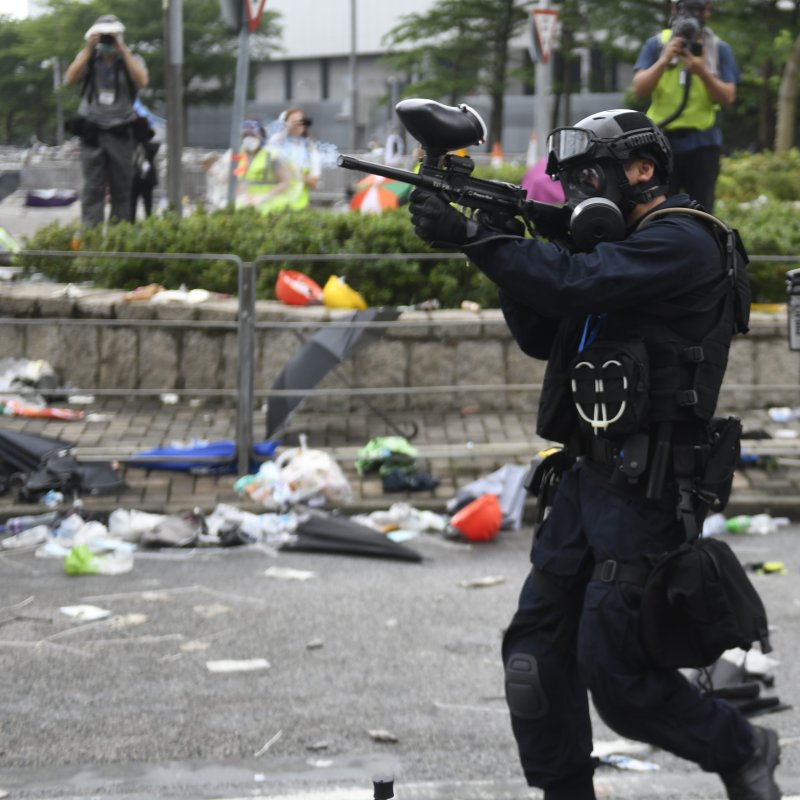1 of 4 | Police fire rubber bullets at protesters Wednesday during a rally against an extradition bill outside the Legislative Council in Hong Kong. Photo by Vernon Yuen/EPA-EFE
June 12 (UPI) -- At least 72 people were injured during Riot-like demonstrations in Hong Kong Wednesday that forced the government to postpone a vote on a controversial extradition bill while drawing tear gas and rubber bullets from police.
A reading for the bill was set for Wednesday but the Legislative Council said it would be postponed to "a later time," as protesters choked streets and demanded the bill to be withdrawn. They created piles of bricks that had been extracted from sidewalks. People also walked out on their jobs and schools to protest.
The proposed law would allow for some criminal suspects to be turned over to Communist Party-controlled courts in mainland China. Residents of Hong Kong, a Chinese territory, have more freedoms than those in China and opponents fear democracy advocates, journalists and others could be targeted with the proposed law.
Tens of thousands crowded the streets, closing them off to traffic and creating what police called a "riot situation." In response, officers used tear gas and fired rubber bullets in what's believed to be the largest public demonstration since the 1997 handover of Hong Kong from British to Chinese rule. The forceful measures were also deployed within the Legislative Council building, a first in the city's history, aimed at some protesters who tried to force their way into the chamber where the bill was to be debated.
At least 72 people were injured in the chaos, including journalists, police and protesters, the South China Morning Post reported.
Hong Kong Police Commissioner Stephen Lo said he had "no choice" but to use force. Police raised a banner above the crowd that read, "stop charging or we use force." Earlier, Hong Kong Chief Secretary Matthew Cheung urged demonstrators to disperse so legislators could resume work and traffic, which ground to a halt when protesters clogged the streets, could resume.
Asked about the extradition law on local television, Cheung said, "I have never felt a guilty conscience over this."
In a pre-recorded, three-minute video Wednesday, Hong Kong Chief Executive Carrie Lam condemned the protesters for having carried out an "organized riot."
"This is not an act that shows love for Hong Kong," she said.
For the first time, she acknowledged that the bill is controversial while comparing the protesters to a little boy who went unpunished as a child and grows up wishing to have been disciplined.
She also rejected claims that she had "sold out" Hong Kong to China.
"I was born here, raised here like every other Hong Konger," she said in the emotional address. "For my love of this place, I have made no small amount of sacrifices."
Protests began over the weekend with organizers claiming over a million people demonstrated and calling for the resignation of Lam. Police estimated 240,000 were in attendance at the protest's peak. Many of the protesters started gathering Tuesday night.
Hong Kong is allowed to keep its own local institutions under a "one country, two systems" arrangement and protesters see the bill as a whittling away autonomy. Pro-Beijing politicians on the island, however, see it as a measure to prevent the city from turning into a safe haven for fugitives of China law.
President Donald Trump spoke to reporters from Washington Wednesday saying he hoped a solution could be made between Beijing and the protesters.
"That was as big a demonstration as I've ever seen, so I hope it all works out for China and for Hong Kong," he said.
The U.S. State Department this week stated concerns that a "lack of procedural protection" in the proposal could undermine Hong Kong's autonomy and damage the territory's "longstanding protections of human rights, fundamental freedoms and democratic values."















